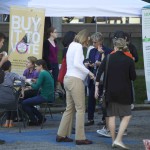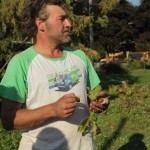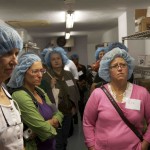City to Country Tour #1: Institutional Procurement
Posted: June 17, 2012
Categories: Food in the News / Growing Good Food Ideas / Virtual Tours
By Linda Swanston, Food Forward
The phrase “institutional procurement” isn’t the most exciting in the local food systems lexicon, but even if we hadn’t been a bus load of enthusiasts, the City to Country institutional procurement tour last October highlighted just how important, interesting, and inspiring this facet of the food system can be. The diversity of perspectives on our bus – including major food service corporation staff, regional food partnership organizers, and school food program supporters – made the tour even more lively and enjoyable.
The first stop on our tour was the University of Toronto. Lucky for us our visit coincided with the University’s local food fair. We got to sample Ontario short rib beef wraps with coleslaw from Jaco Lokker (the chef named a 2011 Local Food Champion by the Ontario Broader Public Sector fund) – absolutely delicious!
Chef Jaco talks about the UofT local sustainable food fair from Sustain Ontario on Vimeo.
We also heard first-hand from Lori Stahlbrand how the University of Toronto is innovative not only in its use of local foods in student meals, but also the steps it took to help establish Local Food Plus (LFP), a regional certification and partnership organization. For institutions interested in local procurement, deciding where to start can be a daunting prospect. LFP came into being to help UofT negotiate just such a beginning.
LFP helped UofT establish benchmarks and goals to ensure that when Aramark won the institution’s massive food service contract they were committed to increasing the percentage of local food they used in cafeteria meals.
Learning about LFP and how it has worked at UofT got us all thinking about the role of certification in bringing more local food into institutions.

Local Food Plus table at UofT
Our day started with great food and big ideas about certification and institutional buying power, and ended with a reminder of why it’s all so important. At our last stop Sandy Griffiths of Meadowsweet Farms invited us all to come back sometime and help pick and sort his organic hops in an old fashioned work-bee. His friendly enthusiasm for his gardens and heritage breed pigs brought home the desirability of small-scale agricultural production with a focus on social and ecological sustainability.
Meadowsweet Farms produces hops for Toronto’s Steamwhistle Brewery, and currently scaling up an organic market garden. Like many small producers it’s not that Sandy isn’t interested in selling to institutions like hospitals, universities or long-term care facilities, but rather the infrastructure doesn’t always exist.

Sandy from Meadowsweet
For buyers committed to sustainability 100km Foods offers a single point of contact to over 15 local producers, many offering certified organic or LFP products. For growers, Paul and Grace are helping establish a reliable market for their products that recognizes the added value of a commitment to sustainable practices.
A tour of another of 100km Foods producer, Greenbelt Greenhouses, offered fascinating insights into some of the other challenges local institutional procurement faces in southern Ontario. Greenbelt Greenhouses grow certified organic microgreens year round. Anyone who has tried to eat locally in Ontario knows the difficulties of sourcing a regional meal in mid-February. Ian Adamson explained how greenhouse growing is an important element of extending the growing season and ensuring large institutional buyers can have consistent access to the volume of produce they need.
So, there are producers growing food sustainably in the region, and distributors working to bring the food to market but, beyond UofT, what is happening at other Toronto institutions? In the health sector Joshna Maharaj at Scarborough General Hospital is working tirelessly with support from the Broader Public Sector Fund to re-imagine patient menus to incorporate more local Ontario-grown food.
We got a great tour of the hospital’s kitchen facilities and sampled some delicious muffins made with local carrots. We heard how in the 1980s when many hospitals were replacing their kitchen facilities with rethermalization units to steam heat ready-made meals, Scarborough food services staff resisted. The fact that Scarborough still has steam kettles and food preparation space makes Joshna’s job that much easier. Today, many new healthcare institutions are built without kitchen facilities, making institutional procurement of raw ingredients challenging. Getting local food into institutions requires infrastructure capacity, alongside willing suppliers and distributors.
Between all the inspirational and thought-provoking stops on our tour we had some great discussions on the bus about what we saw as the biggest challenges and opportunities for institutional local procurement. Back at Lawrence Heights Community Centre with so many great ideas bouncing around it was quite the task to narrow down and choose a few key recommendations. In the end it was an idea we’d heard echoed in various ways throughout the tour that really stood out: a network of food collection hubs. We heard how useful it would be if secure refrigeration units were set up so rather than going farm-to-farm, distributors could pick up from a semi-centralized collection point and then bring the produce into the city. This was just one idea of many, and everyone on our tour was excited to keep the conversation going in their own organizations.
Linda Swanston works with Food Forward to educate, network, and advocate for sustainable food systems at the municipal level, and had the pleasure of co-facilitating the tour with Jodi Callan who worked on the City of Toronto’s local procurement file.

